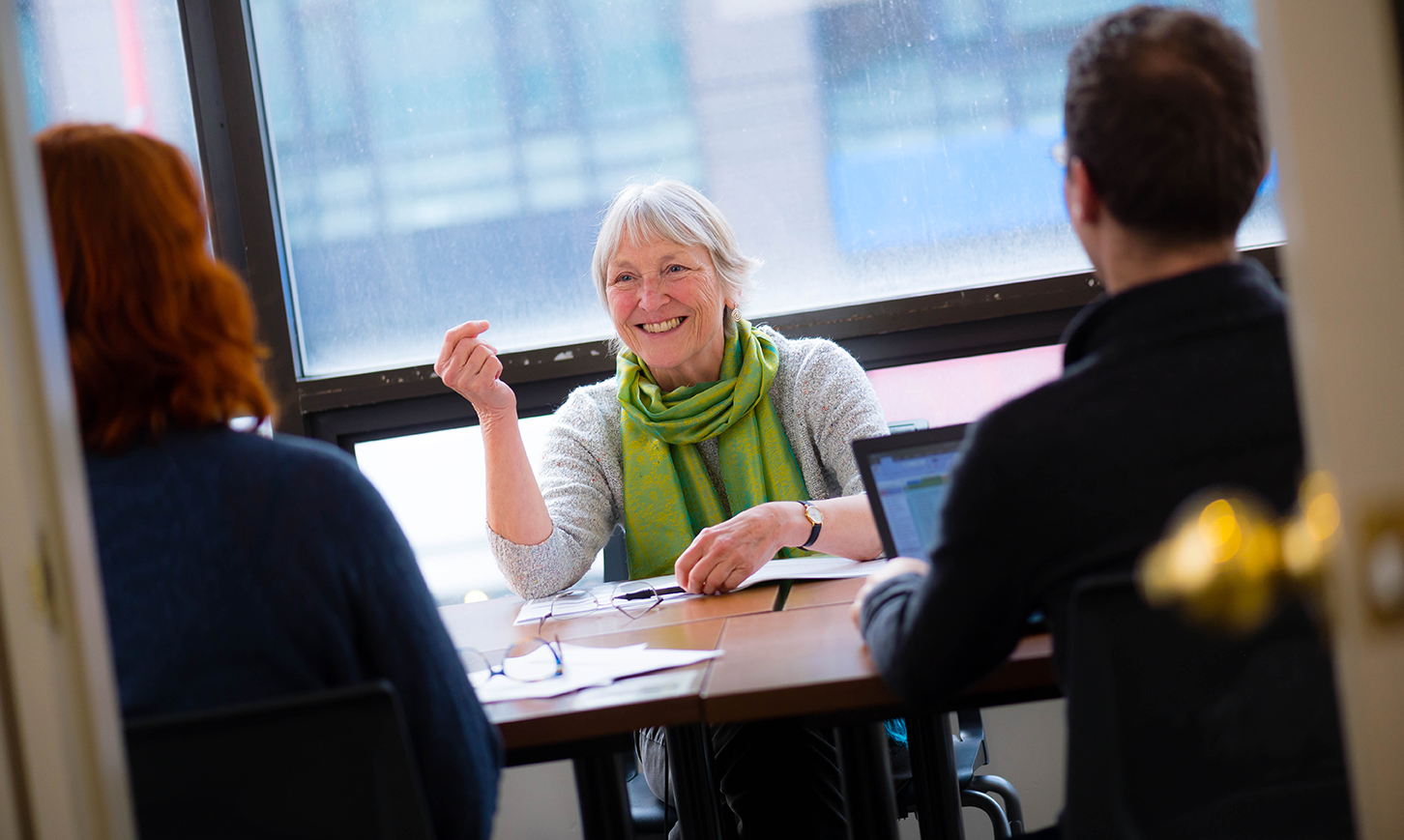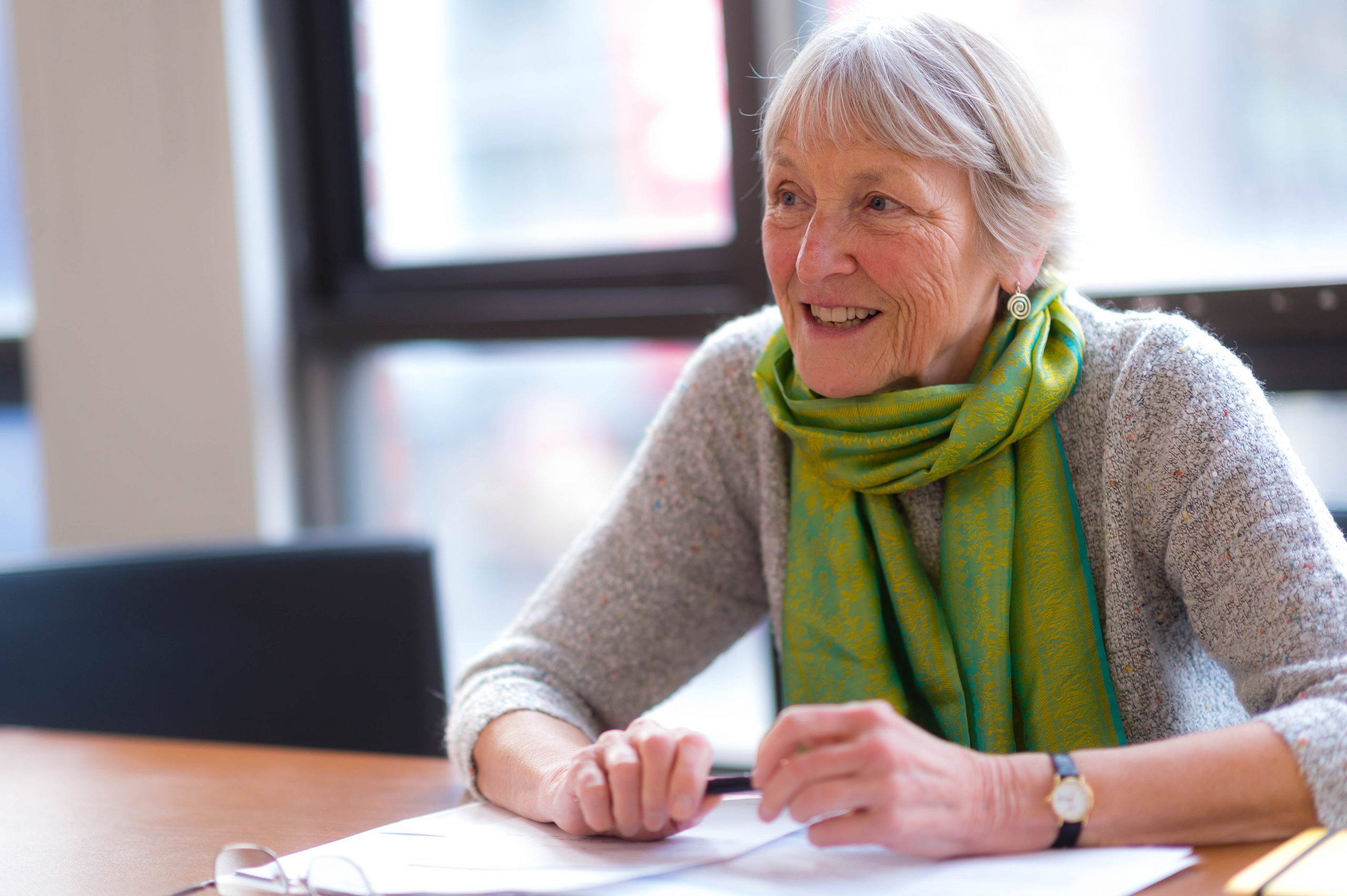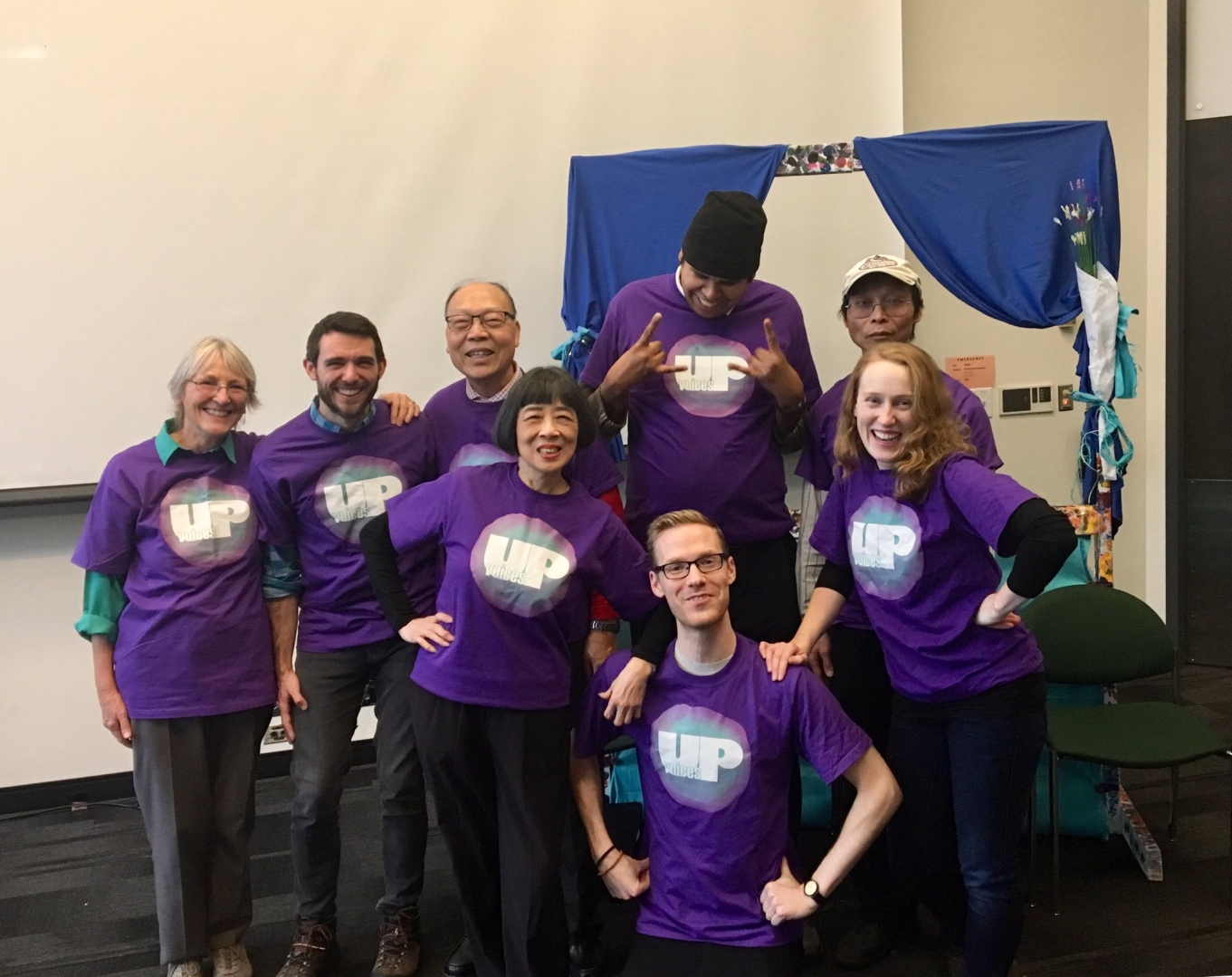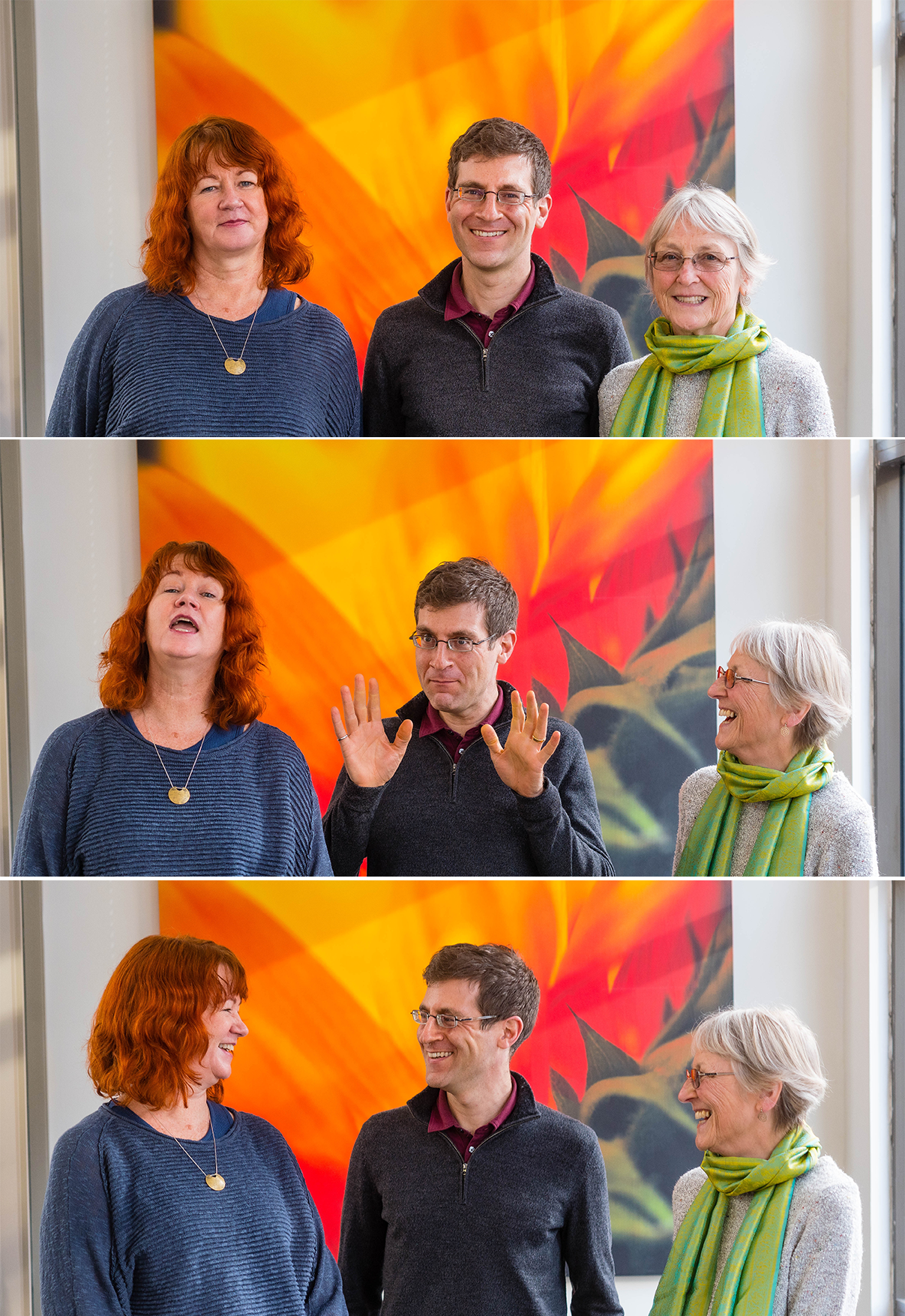Dr. Angela Towle united UBC’s academic mission and Downtown Eastside goals with clear-eyed strategy and a roll-up-your-sleeves attitude. A look back as her term ends.
 Geoff D’Auria
Geoff D’Auria
Communications Specialist
UBC Learning Exchange
Photos by Paul Joseph, UBC Brand & Marketing (except where noted).
NOTE: The job posting for the Academic Director at the UBC Learning Exchange is now open for applications.
This story was originally posted April 6, 2022 on the UBC Learning Exchange website.

A stellar academic reputation. Extensive network in, and a deep understanding of, the UBC ecosystem. The rigorous approach of a community-engaged scholar with experience building educational programs.
Kathleen Leahy had some ideas about what was needed when the Learning Exchange team started looking for the unit’s first academic director back in 2011.
As director, Kathleen would work closely with this person in a unique dual-director structure where she would oversee day-to-day operations while the new academic director provided the academic vision.
So, these were top of mind. So, too, some intangibles.
The ability to listen deeply to all voices. An awareness of the impact of power imbalances. A certain resistance to elitism and understanding that expertise also comes from community. A collaborator.
The role wasn’t what one might expect at a university and still isn’t. The academic director here doesn’t direct from a logistical, budgetary or human resources perspective but leads by setting a vision, mentoring staff and students, and acting as an academic champion—critical for an off-campus team that works in the heart of the Downtown Eastside.
One candidate stood out: Dr. Angela Towle.

Angela is an Associate Professor in the Faculty of Medicine and a Senior Scholar in the Centre for Health Education Scholarship. She spent eight years as an Associate Dean in Medicine where she helped expand the medical school and renew the curriculum.
Tangibles? Check. Intangibles?
Angela also has a long career in work that centres patients in health decisions.
“Angela was the missing piece,” said Kathleen, looking back as Angela’s tenure comes to an end this summer. “We were already doing innovative work collaborating with the Downtown Eastside community but Angela really showed us the potential we had to support UBC’s academic mandate at the same time.”
Ten years on and the UBC Learning Exchange is recognized as a leading model for how to integrate community goals and university objectives, according to a recent external academic review.
To get there, Angela took a systematic, structured and scholarly approach that centred local residents. She expanded the range and number of student roles and made sure they aligned with faculty learning objectives. She believed the Learning Exchange could support UBC researchers and the Downtown Eastside community to connect in a good way—a bold stance. And she mentored the Learning Exchange team on the scholarship of community engagement, program evaluations and university culture in general.
Centring community voices
Take the development of the popular Seniors Thrive program.
Seniors Thrive is an offshoot of the Learning Exchange’s popular English Conversation Program (ECP). Local seniors, it became apparent, were using the program to socialize and connect as much as practice English.
Even before the recent COVID-19 lock-downs, social isolation was a particular concern in the Downtown Eastside, where one in five seniors live alone and where about 36 per cent do not speak English as a first language.
“We realized,” explained Spring Gillard, the ECP Coordinator, “there was a seniors wellness program hiding in the English Conversation Program. So, based on their feedback, we created a program where they could practice English while participating in fun, educational, social activities, like dancing or singing.”
“It’s a really interesting model for thinking about how to learn language in different ways,” Angela said. “There’s a kind of social aspect, which becomes even stronger when you’re doing an activity together—people support each other. So, there’s a higher degree of connection and people build confidence. Learning a language is a lot about confidence.”
Angela set up the structure that helped Seniors Thrive emerge—a steering committee and a program advisory group that included participants and an evaluator.
You may have just glossed over that part about an evaluator. It’s critical to understanding the success of the program and Angela’s part in it. While simple in concept, evaluations require considerable care and thoughtfulness, but they can also be left to the end and forgotten after.
With Seniors Thrive, Angela suggested inverting the traditional model. “I thought it would be interesting to build in evaluation from the start,” Angela said.
So, Angela invited Dr. Chris Lovato, whose research and teaching at UBC involves the evaluation of health programs, to join the steering committee. With Dr. Lovato’s guidance and funding from the Carraressi Foundation that Angela helped secure, the team hired a dedicated evaluation specialist to work with the program from the start, allowing the team to assess and adjust every few months based on participant feedback.
Angela then connected the program with UBC medical students and pharmacy students to present health-related topics, such as how to talk to your doctor or sex education for older people.
The result is a popular Downtown Eastside wellness and literacy program that connects seniors (even virtually through the COVID-19 period) and provides transformative learning for students in a variety of roles that are aligned with the learning objectives of their different faculties.
In terms of student learning more broadly, at the beginning of Angela’s appointment there were fewer than 20 students at the Learning Exchange each year. Near the end of her term, more than 200 students took part in in-depth experiential learning placements like those mentioned here, and more than 1,000 students participated in one-time activities.
Assessing a program? Write a play
Illustrating again the power of that scholarly approach when it centers local communities, Angela mentored the team on another innovative evaluation project—a participatory theatrical play designed to assess another Learning Exchange program.

Now called Animating Connections, the Learning Lab is a low-barrier program that encourages Downtown Eastside residents to try new things, build relationships and explore leadership roles through ongoing activities, like Mahjong and math clubs, or robotics and button-blanket-making workshops. As such, it was the perfect place to produce with participants a play that would reflect on the program’s impact.
After months of discussion, planning, writing, production and rehearsal, participants and staff, including the evaluator, performed Voices UP! at a conference on community engagement that Angela helped organize at the Learning Exchange.
“Angela was involved in everything,” said Suzie O’Shea, the Learning Lab/Animating Connections Coordinator. “She was the MC at every performance. She led the Q+A sessions afterward. She advocated for the inclusion of community members and they loved working with her.”
“We performed it again at the Canadian Evaluation Society conference and the community members were stars,” said Suzie. “Everyone wanted to talk to them afterward. Every performance was sold out.”
“Some of the things that people would not say in a traditional evaluation interview came out in the play,” said Angela. “Usually no one wants to read an evaluation report—it just sits on a shelf. But everybody wanted to come and see the play. It was fun and engaging and a totally different way of thinking about evaluation.”
“It showed how arts-based methods can be used at many points during a research process,” said Suzie. “At the beginning when you’re collecting the data, when you’re evaluating it, or during knowledge exchange.”
Angela also guided the team in producing an article based on the project for the Canadian Journal of Program Evaluation. In April, the journal awarded the team with its Best Practice Notes award. (Don’t have time to read the journal article? Try the comic book.)
Said Kathleen about the evaluation skills, as well as the other university-related mentoring Angela did with the team: “We are now at a level where we can sit down with other organizations in the Downtown Eastside and say, ‘What you need is… and we can help you because we know UBC has…’. We wouldn’t have had this, our partners in the Downtown Eastside wouldn’t have this, to this degree, without Angela.”
Where ‘research’ is a dirty word
When it came to research, the Learning Exchange had been reluctant to get involved before Angela. “Researched to death with little to show” was the kind of feedback staff would hear from local residents. But Angela didn’t shy away.
“I wanted to explore how we could help the UBC researcher community and the Downtown Eastside community work with each other for mutual benefit,” she said. But she knew she had to move cautiously and meet people where they were at.
“The last thing I wanted to do was to make the situation worse. So, I hired a grad student to do some interviews and find out people’s needs and interests and that’s when we heard people in the Downtown Eastside say there’s a lot of research but they couldn’t put their hands on it or find out who was doing it.”
Knowing that any problem related to information management needed to have librarians as part of the solution, Angela put together the Making Research Accessible initiative (MRAi) and invited librarians from UBC, SFU, and the Vancouver Public library, as well as representatives from other UBC groups, to join.
Five years later, the Downtown Eastside Research Access Portal (DTES RAP) launched with links to more than 1,200 research items from both the university and community. The team behind the portal, led by the Learning Exchange and the UBC Library’s Irving K. Barber Learning Centre (IKBLC), also supports researchers to preserve open access versions of their work. There is also now a community engagement librarian at the Learning Exchange dedicated to finding the research that community members and groups need.
In the fall of 2021, the BC Library Association awarded the MRAi Steering Committee with its prestigious Eureka Award.
“We’re working on complex issues with our scholarly communications and, in large part because of Angela, we’re also creating groundbreaking roles for student librarians and recent graduates interested in community-led librarianship to learn how to approach these issues,” said Aleha McCauley, the RAP project lead and community engagement librarian at IKBLC. “Angela’s a great listener and a principled person who creates space for everyone and yet somehow keeps us all focused and on track. We’ll miss her.”
In terms of research related to the Downtown Eastside more generally, Angela also helped build the unit’s capacity to support researchers to use a community-based participatory research approach. She not only mentored the team but also helped build the case for and mentored a Community-Based Research Coordinator. The Learning Exchange now assists a range of research groups to connect with the Downtown Eastside, and vice versa.
‘It’s been brilliant’

The UBC Learning Exchange leadership team. From left: Kathleen Leahy, Director, Chris Koch, Operations Manager, and Angela Towle, Academic Director.
As Angela thinks back on her time at the Learning Exchange, her thoughts went to these and other projects that characterized the roll-up-her-sleeves nature of the role, but when she reflected on how the experience impacted her, something else comes up:
“I remember on one particular occasion I had been at a university-related event downtown and I just didn’t feel like I was in my element. Later that day I came to the Learning Exchange—I walked through the door and I get a big welcome from the student at reception, and then Suzie gives me a big ‘Hello’ and a hug. It just felt like they cared about me as a person. It felt so welcoming and warm.”
“All of the people at the Learning Exchange are very skilled in so many ways. I see them working and think, ‘Wow, that’s really cool. I could never do that.’ I gained a better understanding of the complexity and skill and emotional intelligence that you need to work effectively with a community like the Downtown Eastside. I’ve always enjoyed working with people who are doing real stuff and are skilled at it and creative and innovative and whose first response to things is ‘Let’s give it a go!’”
When Kathleen reflects on her time working with Angela as dual directors, she marvels at how Angela manages to cut through the clutter and offer a clear-eyed way forward, and she mentions how much she personally appreciated her mentorship and collaboration, summing it up with a simple: “It’s been brilliant.”
The job posting for the Academic Director at the UBC Learning Exchange is now open for applications.




